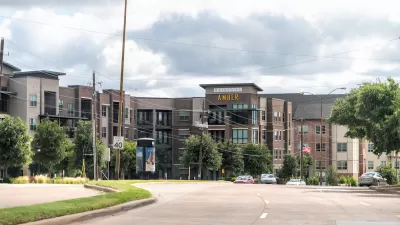The city council will vote on a proposal to eliminate single-family only zoning in favor of rules that would allow up to six units per residential lot.

“Vancouver housing could become radically more dense if the city allows up to six homes per lot for the half of its land traditionally reserved for single-detached dwellings, as council votes this week on whether to send the change to public hearing,” according to an article by Frances Bula in The Globe and Mail.
Under the proposed new rules, multi-unit buildings will be allowed to take up a larger percentage of lots than before. Theresa O’Donnell, Vancouver’s head planner, said “This is rezoning the 52 per cent of the city that’s effectively been off the table for years.”
If approved by the city council, the proposal will go to public hearing and could take effect next January.
“The city’s projections indicate that a single-detached-house property that sells for $2.8-million now could become home to four smaller homes that sell for $1.1-million apiece – still not cheap, but less than the single house,” Bula adds.
“Some housing advocates have criticized the new policy as being unlikely to get a lot of take-up because it will be much more challenging for average homeowners to finance a fourplex or sixplex, compared with a laneway house,” known as an accessory dwelling unit in the United States. Local builders say they predict demand will be high, citing the rise in demand for duplexes when the city legalized them in 2019.
FULL STORY: Vancouver considering eliminating single-family residential zoning rules

Study: Maui’s Plan to Convert Vacation Rentals to Long-Term Housing Could Cause Nearly $1 Billion Economic Loss
The plan would reduce visitor accommodation by 25,% resulting in 1,900 jobs lost.

North Texas Transit Leaders Tout Benefits of TOD for Growing Region
At a summit focused on transit-oriented development, policymakers discussed how North Texas’ expanded light rail system can serve as a tool for economic growth.

Why Should We Subsidize Public Transportation?
Many public transit agencies face financial stress due to rising costs, declining fare revenue, and declining subsidies. Transit advocates must provide a strong business case for increasing public transit funding.

How to Make US Trains Faster
Changes to boarding platforms and a switch to electric trains could improve U.S. passenger rail service without the added cost of high-speed rail.

Columbia’s Revitalized ‘Loop’ Is a Hub for Local Entrepreneurs
A focus on small businesses is helping a commercial corridor in Columbia, Missouri thrive.

Invasive Insect Threatens Minnesota’s Ash Forests
The Emerald Ash Borer is a rapidly spreading invasive pest threatening Minnesota’s ash trees, and homeowners are encouraged to plant diverse replacement species, avoid moving ash firewood, and monitor for signs of infestation.
Urban Design for Planners 1: Software Tools
This six-course series explores essential urban design concepts using open source software and equips planners with the tools they need to participate fully in the urban design process.
Planning for Universal Design
Learn the tools for implementing Universal Design in planning regulations.
City of Santa Clarita
Ascent Environmental
Institute for Housing and Urban Development Studies (IHS)
City of Grandview
Harvard GSD Executive Education
Toledo-Lucas County Plan Commissions
Salt Lake City
NYU Wagner Graduate School of Public Service





























